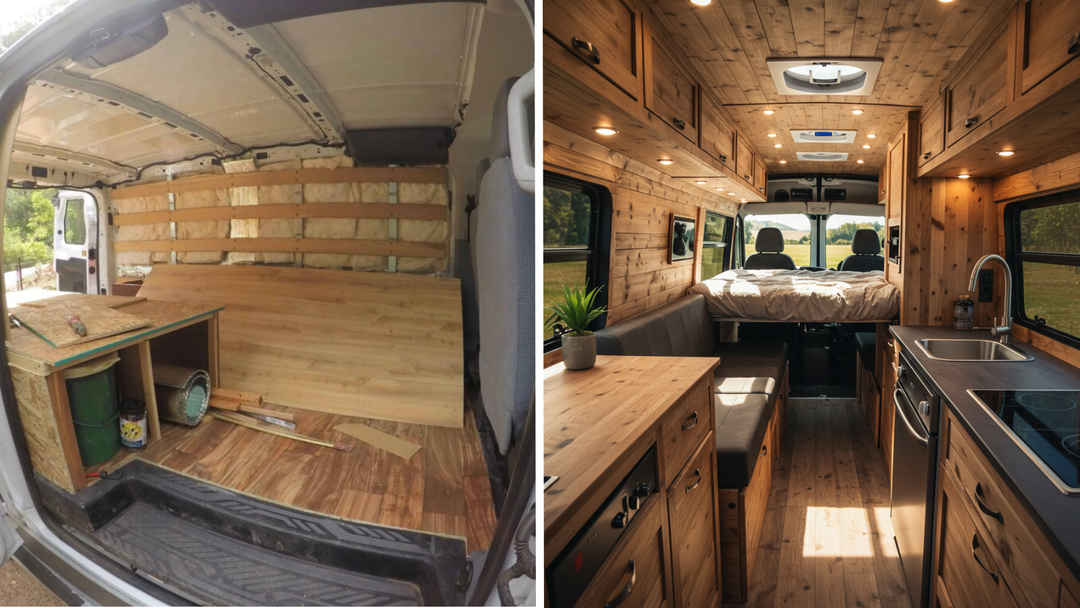Van with East West Sleeping: What You Need to Know Before You Build
Sideways Sleep, More Space, Better Builds
If you’ve spent any time planning your van conversion, you’ve probably run into the term east west sleeping. And if you haven’t—this guide will be your secret weapon.
East west sleeping (also called sideways sleeping) is exactly what it sounds like: placing your bed across the width of the van, rather than running it front to back.
This simple switch can unlock a better layout, smarter storage, and a van interior that doesn’t feel like a coffin on wheels.
Here’s what you need to know to make it work.
Why East West Sleeping Saves Space
When your bed runs front to back, it usually eats up 72"–75" of your van’s length. That’s a ton of square footage that could be used for:
-
A longer kitchen
-
A bigger garage area
-
Actual living space
By sleeping east west, you can reclaim up to 12"–14" of floor length—and that changes everything.

More room = better layout options = a van that feels open instead of cramped.
What Vans Work Best with East West Sleeping?
Here’s the honest answer: most vans don’t support east west sleeping natively, unless you’re under 5'9" or okay with curling up.
Let’s look at the three main platforms:
🚐 Mercedes Sprinter

-
Interior width: ~70"
-
Usable width after walls/insulation: ~65"
Without mods, east west sleep is tight or impossible for most adults.
🚐 Ford Transit

-
Interior width: ~70"
-
Usable width: ~66"
Same story as the Sprinter. You’ll need a plan to gain a few extra inches.
🚐 Ram Promaster

-
Interior width: ~75"
-
Usable width: ~70–72"
This is the only van that supports true east west sleeping without modification. That said, you give up mod flexibility and build options in other areas.
How to Make East West Sleeping Possible
If you’re in a Sprinter or Transit and want sideways sleep, you’ve got two main options:
Option 1: Flares or Capsules
These are exterior bump-outs that add width at bed height. They let you sleep fully stretched out while keeping a low bed height.
Builder Tip: In a Sprinter, flares are the go-to. But they look unfinished without interior trim work.
✅ Use Sprinter Flare Trim Rings to cleanly finish your flare and match it to your bed height with adjustable sill levels.
Option 2: Inset Window Sleepers
This is a more stealth-friendly move. You trim into the factory window cavities and install a molded insert that adds space inside the van.
✅ Our Transit Innie Sleepers give you a few crucial inches—enough to make sideways sleeping possible without flares or exterior mods.
Pro Builder Tips for East West Success
🛠 Measure at bed height. Vans get narrower as you go up. Always measure where your mattress will actually sit (usually 30–36" from the floor).
🛠 Plan your insulation early. You might only have 1" of play on each side. Over-insulating the walls can cost you your stretch space.
🛠 Match trim to bed height. If you’re using flares, your trim ring needs to align perfectly with your platform to avoid cold air gaps or weird cut lines.
🛠 Test with foam or cardboard. Mock up your sleep area before committing to framing.
Final Thoughts: East West is a Smart Move—If You Plan for It
Sleeping sideways is one of the easiest layout hacks to free up space in your van. But it only works if you build for it from the start.
-
In a Sprinter, pair flares with trim rings
-
In a Transit, use window cavity solutions like Innie Sleepers
-
In a Promaster, you may be able to get away with a stock layout—but trim and plan carefully
✅ Want to see how this fits into the bigger picture? Check out our full guide: Sleeping Capsules for Vans
Build smart. Sleep sideways. Travel far.
– The GoCode Team





